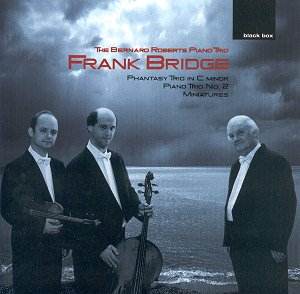|
|
Search MusicWeb Here |
|
 |
||
|
Founder:
Len Mullenger (1942-2025) Editor
in Chief:John Quinn
|
|
|
Search MusicWeb Here |
|
 |
||
|
Founder:
Len Mullenger (1942-2025) Editor
in Chief:John Quinn
|
 |
Frank BRIDGE
(1879-1941) Phantasy Trio in C minor (1907) Piano Trio no.2 (1929) Miniatures (c.1908) Recorded at St.George’s, Brandon Hill, 2nd-3rd April 1995 |
| CD available for post-free online mail-order or you may download individual tracks. For some labels you can download the entire CD with a single click and make HUGE savings. The price you see is the price you pay! The full booklet notes are available on-line. |  |
|
NOTE • Click on the button and you can buy the disc or read the booklet details • You can also access each track which you may then sample or down load. • Further Information. |
|
|
Viola jokes - dontcha hate em??!! Well actually no – some of them are quite funny. But the ideal way to refute them is to point to the astonishing number of great musicians who have played the instrument. Mozart, of course – not a bad start – then there’s Dvořák, Hindemith, Frank Bridge, the subject of this disc, and his illustrious pupil Benjamin Britten. Not bad to be going on with, and, as a mere bassoonist myself, I have to admit to not being able to compete on that score – the trail goes a little cold after Elgar!
Bridge was in fact a fine string player, and spent many years as a member of the English String Quartet, which must have given him a rare insight into the possibilities of the various chamber music media. The major work here is the Piano Trio no.2 of his mature years, which is enclosed between two earlier works, the Phantasy Trio of 1907, and four of the Miniatures for piano trio, which were composed in three sets between 1908 and 1915. The Phantasy Trio is a powerful single movement work, which made a considerable impact at its first performance in 1909. It falls into several strongly characterised sections, from a defiant and moody opening, through moments of warm lyricism and playful brilliance. The abiding impression is of a brooding C minor, with despondency never far away, and the Roberts Trio capture the feeling of the piece superbly. As members of the same family, you’d expect a certain empathy, and there’s plenty of that; but each player makes a markedly individual contribution too.
The Piano Trio no.2 is a major work of 20th century chamber music, and uses the medium in a strikingly original way. The opening is memorable – soft sustained high notes in the strings, answered by rippling phrases in the piano. The harmonic language verges on the atonal, causing some critics at the time of its first performance to take Bridge to task for allowing himself to fall under the dread influence of Schönberg, among others. Bridge professed himself to be unmoved by this, and indeed the work has a strong individualism that comes through with no difficulty. It is true, however, that the piece shows Bridge’s awareness of current musical developments in Europe, and is anything but parochial, a charge that could with some justification be levelled at some of his contemporaries.
More significant is the mood of the work; the first movement, Allegretto ben moderato, is sinister, with very dark undertones and a sense of tension and foreboding. The middle movements consist of an edgy scherzo followed by a haunted and haunting Andante molto moderato. The shadows persist even into the finale, a strenuous Allegro ma non troppo, and Bridge avoids the temptation to offer an emotional resolution; instead the music seems to dissolve into the ether. All the way through this remarkable piece, the writing for the trio is effortlessly resourceful and imaginative, and the Roberts Trio give a deeply felt and perfectly judged account.
The Miniatures are, as the name suggest, much lighter fare, and make an ideal foil to the rather serious and fraught preceding works. Even here, though, Bridge’s naturally somewhat mournful nature is apparent – minor keys are prevalent – and it’s quite a relief to reach the relatively cheerful Hornpipe that concludes the programme.
Black Box have come up with an excellent recording. At times I asked myself if the piano might not be a little further forward. But then one would risk overpowering the strings, a common balance problem with piano trios, and the gain here is a very realistic sense of space that allows the often delicious textures of Bridge’s music to be fully savoured. (By the way, an interesting if not particularly significant point regarding spelling arises; the title of the first work on this disc is normally given as ‘Phantasie Trio’, whereas Black Box give ‘Phantasy’ instead. Odd, and I would have welcomed a word of explanation.
This fine disc takes another important step in furthering the process of recognising Bridge’s mastery, and removing the irritating label of ‘Benjamin Britten’s teacher’, however proud he may have been of his protégé. Gwyn Parry-Jones
|
Piano
Trio No. 2 (1929) Miniatures
(c. 1908) Get a free QuickTime download here |
|
ADDITIONAL INFORMATION •
You can sample only 30 seconds (or 15% if that is longer) of a given track. Select from the View tracks list. Each sample will normally start from the beginning but you can drag the slider to any position before pressing play. • PLEASE NOTE: If you are behind a firewall and the sound is prematurely terminated you may need to register Ludwig as a trusted source with your firewall software.
•You will need Quicktime to hear sound samples. Get a free Quicktime download here • If you cannot see the "Sample All Tracks" button you need to download Flash from here.
|
|
|
Return to Index |